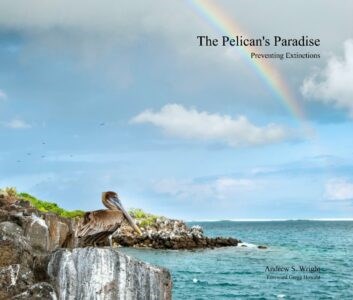“And what is the Accretocene?” you might well ask. Andrew Wright, Bowen resident and author of Pelican’s Paradise: Preventing Extinctions, explains that it is the era when human efforts lead to a rapid increase in rewilding the planet. He and conservationist Greg Howald coined the word, and now, to their delight, it’s being used by others.
It’s a word that expresses hope for the future, a hope that Wright’s experiences as an engineer and a photographer led him to believe is justified.
As an engineer, Wright founded a telecommunications tech company before becoming an adjunct professor at Simon Fraser University in the Faculty of the Environment. As a photographer, he has documented the work of the Island Conservation Society. Wright has the unique perspective of seeing current global emergencies through the lens of his camera and the pragmatic eyes of an engineer.
In his third book, Pelican’s Paradise: Preventing Extinction, Wright records how Island Conservation brought fragile life back from the brink of extinction. Using engaging prose and stunning photographs, he documents the flourishing of biodiversity on five islands, one of which is in Haida Gwaii.
Wrights’ passion for using photography to document the promise of rewilding comes from his commitment to “purposeful photography,” and his underlying belief that everything is connected. As he says, “The security of nature is connected to human well-being; there is a symbiotic relationship.”
He is careful to make a distinction between ‘rewilding’ and ‘restoring.’ Once the delicate balance of an ecosystem has been lost, we don’t have the ability to ensure it will be restored to its former state. But rewilding – returning areas to “bioproductive states” – is an achievable goal.
As he puts it, “The creation of the right conditions allows for nature to rewild impaired and impacted regions.” Biodiversity can once again flourish, and extinctions can be prevented. For Wright, the distinction between rewilding and restoring “allows us to imagine the possibility of rewilding on a global scale.”
Island Conservation spends years carefully researching and assessing ecosystems before intervening with responses that are tailored to each natural and human community. Island Conservation works collaboratively with other organizations and brings to bear a wide range of expertise.
The contributions of an ecotoxicologist, for example, can address the complex issues of how to rid an island of invasive species without harming indigenous ones. The organization’s careful research and ability to work collaboratively with others have resulted in rewilding on islands with issues as broad as devastation by rats or destruction caused by bomb testing.
To those who say that human intervention is “playing God,” Wright’s response is that we have been playing God for hundreds, in some cases thousands of years, just very, very badly. Now we have the science and the technology to intervene positively, and “we can play better.” This is the work of Island Conservation, “a wild, beautiful, aspiring endeavour that provides a truly hopeful and scalable vision for the planet.”
Andrew Wright is speaking about Pelican’s Paradise: Preventing Extinctions and presenting his photographs at an Author Talk this Sunday, September 25 at 2 pm in the Bowen Library Annex. The talk is presented in partnership by the Bowen Island Public Library and Bowen Island Food Resilience Society.
We encourage you to join him this Sunday and bring along anyone you think might enjoy an inspiring, hopeful message and beautiful photographs.



